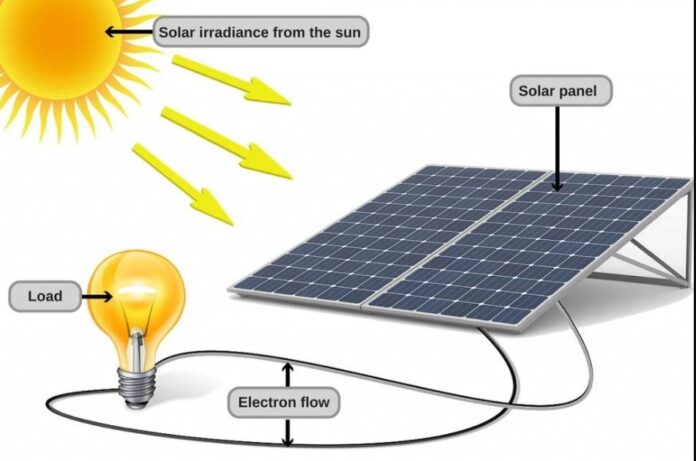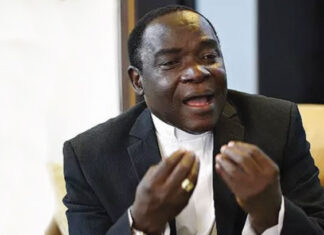Solar energy is cheaper, portable, and eco-friendly
By Jeph Ajobaju, Chief Copy Editor
Abuja has prioritised since 2020 the installation of prepaid power meters nationwide – which means both ‘pay as you use’ and ‘if you don’t pay, you won’t have electricity’.
Customers now pay upfront to have power and, in turn, Distribution Companies (DisCos) ensure fairly predictable supply or else they would not generate revenue.
This twin approach has led to significant improvement in power supply, at least in Lagos and other cities.
But prepaid meter for fossil grid is not the final solution to inadequate power supply. Solar energy is. Or, in the meantime, a mixture of solar and fossil power.
Solar power works without fossil grid connection, but it cannot carry for long heavy appliances such as fridge, pressing iron, microwave, cooker, boiling kettle, and air conditioner.
However, power stations in space are being researched by scientists to develop more powerful solar panels and batteries on earth to operate all electrical appliances without grid connection using fossil fuel.
One hour of direct sunlight can produce energy for the entire earth for a year, and the cost of solar panels has fallen 99 per cent for over four decades, according to energymatters.com.
_________________________________________________________________
Related articles:
Surprising facts about solar energy
ColdHubs is using solar energy to reduce N3.5tr food waste
__________________________________________________________________
More consumers resort to solar power
More businesses and homes worldwide are resorting to solar energy as pressure mounts on countries to shift away from fossil fuel to green power to prevent the collapse of ecosystems by climate change.
Only 0.35 per cent of Nigeria’s total energy supply comes from hydropower and a mere 0.001 per cent from wind and solar power, in a country heavily dependent on oil for electricity and for export for hard currency.
According to the Geopolitical Gains and Losses (GeGaLo) index, Nigeria ranks 149 out of 156 countries that will benefit from energy transition, but the country is beginning to recognise the inevitability of solar power.
And research in solar energy is expected to boost Nigeria’s effort to supply stable electricity to homes and businesses with the added value of affordability and clean energy to stave off environmental pollution.
Households currently pay about N4,000 monthly over a three-year period to benefit from the government’s Solar Homes Systems, also called Solar Power Naija, which began in February.
The scheme is being implemented by the Rural Electrification Agency (REA) to fix power supply challenge with priority given to rural areas and urban settlements underserved or cut off from the national grid.
There is an option of outright ownership of solar panels at a cost ranging from N1, 500 per week to N4,000 per month for three years, which will enable as many as 25 million Nigerians to own personal solar systems in their homes.
The report below published by PREMIUM TIMES underscores the huge relief that increased solar power supply will bring to homes and businesses.
Surviving long power cuts
Experts say solar-based generating units can be built up far quicker than traditional power plants and has proven capability to plug the gap in Nigeria’s energy requirements.
Exorbitant electricity bills never stop coming, yet lengthy power cuts dog 58-year-old Olanrewaju Jaji’s shop where she sells soft drinks in Ikorodu, a border town north of Nigeria’s economic nerve centre, Lagos.
She had bought different sizes of generators, but they hardly lasted. She had almost given up until a flicker of hope came to her doorstep: a low budget solar-powered appliance advertised to her by a local merchant.
A one-off payment for the appliance would cost her N52,000, she was told, but payment in instalment would be higher. Even at that, the appliances are only available for distribution in Lagos.
Although the installation cannot power any of her three freezers, the fact that she can light up her shop at night, power her fan and radio – her major source of news – gave her some respite.
Take irregular power supply away from business owners like Jaji, then 80 per cent of Nigerian businesses would have solved their second biggest challenge after lack of access to finance.
If the same is done to individuals, then around 55 per cent of Nigerians, per a government report, who have no access to grid-connected electricity, would also have a major burden taken off.
Power generation capacity
Nigeria’s power generation capacity, which consists of gas-fired and hydro-powered stations, is about 13,000 Megawatts, but the electricity transmitted remains less than 4,000MW/hour.
This is unlike South Africa, a country with less than a third of Nigeria’s population, which has an installed electricity capacity that is four times more than Nigeria’s, according to the U.S. Power Africa programme.
Again, South Africa’s per capita energy consumption is 31 times higher than Nigeria’s, even though the southern African nation is Africa’s second-largest economy.
Nigeria, Africa’s largest economy, loses an estimated $29 billion a year due to this, which is about 6 per cent of the Gross Domestic Product (GDP), according to the International Monetary Fund (IMF).
The government report stated that to keep pace with its fellow economic giants like South Africa, Nigeria would need to see a five fold increase in electricity consumption.
In search of an alternative, households and businesses have resorted to fossil-fueled generators that gulp about $14 billion annually and pose environmental and health risks.
Investing in solar power
Nigeria’s location in the tropics offers the country an abundance of sunshine all year round.
Therefore, as Africa’s largest economy and with over 2,600 hours of sunlight per year (about 7 hours of sunlight daily, on average), experts believe Nigeria has the economic war chest and environmental conditions to tap into renewable energy power sources like solar.
According to a research published by Ikponmwosa Oghogho, a lecturer at Delta State University, with this potential, about 1500PJ (the equivalent of 258 barrels of oil) could be available to Nigeria annually from solar energy.
This can be achieved just by using solar appliances with five per cent conversion efficiency over only one per cent of the total land area of the country for about six months of a year.
This shows that more power generation abounds if the solar value chain is explored on a larger scale.
“Due to the numerous disadvantages of conventional fuel sources when compared with solar energy and the recent giant strides in improving solar cell efficiency using a photovoltaic (PV) device that converts 40.8 per cent of light that hits it into electricity,” Oghogho wrote, “Nigeria needs to reposition herself by investing in this invaluable resource to secure the energy future of our economy.”
Estimates by the World Bank suggest that investing in solar-powered plants could increase the availability of electricity to almost 80 million people who currently have none.
This means a transition to solar-based energy could help diversify Nigeria’s energy portfolio and reduce high electricity bills, as was the case for Jaji.
Such transition could also stop the reliance on fossil fuels which come with challenges like pollution through flaring and spillage.
Like Jaji’s experience, solar-powered appliances could also be a good alternative to generating sets without cost and health risks that come with the latter.
Although solar appliances are relatively more expensive than generating sets, the cost pales when compared with the cost of powering, servicing, fueling and maintaining generating sets.
Meanwhile, solar power generation is becoming cheaper than fossil fuel alternatives, according to the International Renewable Energy Agency, an intergovernmental organisation that supports countries’ transition towards sustainable energy.
Solar-based generating units can be built up far quicker than traditional power plants and it has proven capability to plug the gaps in Nigeria’s energy requirements, said Oyeniyi Uthman, CEO of Diadem Global, a power-solution technology startup.
The fact that the solar units can be built in chunks, used with inverter and battery and upgraded to higher capacity as time goes on make them a desirable alternative to generating sets that emit harmful greenhouse gases and other air pollutants into the environment, he added.
Some use inverter alone, he said, with the option of incorporating solar panels later.
An Abuja-based businesswoman, Haulat Yusuf, uses inverter alone and said it has been effective for her family and “when there is power cut for days, you don’t know.”
The downside, however, is that, because the high capacity batteries have to be charged for a long time, it consumes more electricity.
“This increases the amount of electricity units we now buy. But it has been very helpful,” Yusuf said.
“Consumers are getting to know more about solar energy and because it offers them financial savings and power efficiency,” Oyeniyi noted.
“Even when they (consumers) say the cost of installation is much, they come back for more and make more referrals to us.
“Prices of installation are falling as a result of [falling] manufacturing costs and market competition.”
Falling solar panel cost
On the average, powering a three-bedroom household in Nigeria with solar energy costs about N1.8 million and it would come with a battery bank for energy storage and solar panels.
The panels are installed on the roof to independently trap energy, while the solar battery storage systems help to store extra solar energy for later use, and they can be useful at nighttime and rainy days.
A list of invoices issued to Premium Times by Diadem Global showed that prices vary with capacity and range from about N300,000 to N900,000.
When Jaji has more money, she is hoping to upgrade her solar appliances and go for the options that can power her freezers.
Many like her should, too, as she has been telling her circle of friends about solar energy.
But with a population frustrated by years of unmet power demands, there is bound to be palpable fear among Nigerians as they may understandably nurse doubts about the unpopular solar alternative.
Oyeniyi said the price of solar power will continue to crash with its popularity and patronage. Being a technology rather than a fuel, it will dominate the energy space, he said.
Shots at solar power
Some of Nigeria’s shots at major solar-based power projects have stalled, while others have failed or are yet to be completed.
In 2014, former President Goodluck Jonathan launched the Operation Light Up Rural Nigeria (OLRN) project designed to use renewable energy to power 109 rural communities in 16 states, but the project was abandoned after its pilot phase.
Upon his coming in 2015, President Muhammadu Buhari’s administration renamed OLRN as Renewable Energy (Solar) Micro Utility (REMU), which was to install three solar mini-grid projects in the six zones of the country.
The first phase was to provide a solar-powered off-grid plant in three rural communities in Abuja, one of which was flagged off in Durumi, targeted at 1,000 households.
However, an ICIR investigation found that the installation had packed up and was under lock, while the solar-powered street lights were broken.
By 2016, a collaborative project of the REA tagged Energising Education Programme (EEP) was launched to get 37 federal universities off the national grid by introducing clean energy (solar power) in the institutions.
The first phase the programme targets nine universities and one teaching hospital.
A fact check by TheCable found that of the nine, only two solar power plants have been inaugurated, but just one – Federal University Ndufu-Alike Ikwo, Ebonyi – is functioning.
Last March, the federal government launched the $200 million Nigeria Electrification Project (NEP) to provide off-grid solar energy to over 500,000 people across 105,000 households in rural communities nationwide.











